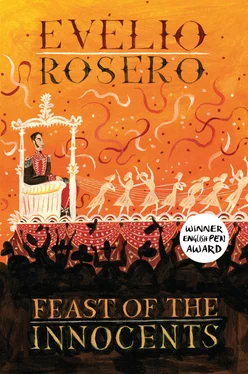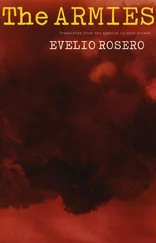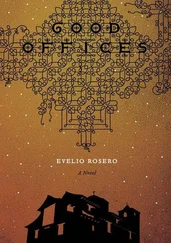“Starting from today, we’ll be keeping Doctor Justo Pastor Proceso López under surveillance,” Quiroz told them. He said it slowly; it was more than an order. And, directing himself towards the poet Puelles, as if confirming who would carry it out: “You know where the doctor lives, don’t you? The doctor will lead you to the carriage. Here are the keys for the Vespa: follow him over the next few days leading up to Black Day, which falls on Thursday, January 5. Follow him until Thursday, but, listen, before White Friday, the day of the parade, we need to know the whereabouts of that reactionary float and destroy it to justly make amends to Bolívar’s memory.”
“And the artisans?” Platter Ilyich asked.
“Nobody mess with the artisans,” Quiroz replied. “A clout or two, at most, nothing major. As Christ put it, forgive them for they know not what they do.”
But why surveillance? — Rodolfo Puelles wondered. He did not hide his dismay. After the categorical “chat” about the policeman, which was not even a critical investigation, and in which only Quiroz’s judgement on sentimentalism was heard, the secret poet Rodolfo Puelles had realized he did not so much inspire respect among his comrades for his resolve on the night of the action in Bogotá, as exactly the opposite: rejection.
Rejection, he jeered himself, and rejection of the worst kind: revulsion.
It was hard to admit, but that was the way it was; he had thought his leading role was going to set him up as a man of action, at least earn him some credit. But, no. Revulsion. This was the conclusion he reached after examining the faces of his comrades, one by one, and their behaviour. Maybe — he thought — they saw I pissed myself when I fired the gun; but at least I fired it, chickenshits, he bawled at them, inwardly. And he already knew that shouting inwardly meant no-one would ever hear him, no-one would ever know of his troubles.
But, nevertheless, there was one person who did not feel revulsion towards him, and he knew who it was, of course: Quiroz. And for that very reason, Quiroz charging him with a job such as surveillance seemed to him an insult. Why not give the task to that halfwit brother of his? And the fact was, in any case, the secret poet Rodolfo Puelles, twenty-two years of age, could not care less about Simón Bolívar and Doctor Proceso and his reactionary carnival float; the only thing he wanted to do was get himself into a brothel during the Black and White Carnival without any of his comrades finding out, without anyone subsequently accusing him of involvement in crimes against humanity, in capitalism’s most characteristic blot on society: prostitution. Thinking about it, Rodolfo Puelles smiled in anguish; he had really determined to make the most of the Black and White Days to finally plunge into the brothel, to discover and smell and celebrate the sex of a flesh-and-blood woman, a real face, real breath, at last, to touch the moon, kiss her inside, deeper inside, much deeper. Now he would have to tail and trail a grumpy gynaecologist who, clearly, was not even a millionaire, as Enrique Quiroz had made out, and he had to tail him and trail him during the January celebrations no less, and follow the mission through to completion: to find out where a stupid carnival float was hidden. What a country. What was I born into? He would have preferred prehistoric times.
Enrique Quiroz was looking at him fixedly.
Rodolfo Puelles picked up the keys for the scooter, without arguing.
And yes, it was glaringly obvious: it was not revulsion on Quiroz’s face, but resentment, envy, Puelles shouted to himself — worse than revulsion, he must be suffering more.
That certainty astonished Puelles: Enrique Quiroz loathed him for being the one who fired the gun, for being the one who had dared , but he loathed him above all for being the one and only witness to his cowardice, the intimidation of Vladimir, hesitant little Enrique, utterly spineless, weren’t the two of them shoulder to shoulder the night of the action? That certainty, rather than making Puelles proud, scared him. His resolve had won him an enemy: Vladimir no less. Was it possible little Enrique believed his leadership under threat? Why not? Stupidity is infinite, he thought.
But after the group said goodbye and dispersed, a worse fear occurred to the secret poet, a real one: perhaps Enrique Quiroz wanted to repeat the exploit with the policeman, but this time with a gynaecologist? “Not that,” he said out loud; such colossal imbecility would not be possible, or would it? Stupidity, he thought again, and then regretted everything and everyone and his own self; “fuck,” he bawled; a terrible desolation seized him: he thought of the mass of youth who were struggling frantically during these years, in every one of the universities in the country, in the schools and colleges, where students and teachers stood by the same ideal. What would happen? Where would it all lead? Wasn’t this energy being wasted? Wasn’t it being sacrificed at the hands of stupidity?
As for him, he would have liked the earth to swallow him up.
Doctor Proceso was overwhelmed too. Once again rain greeted him in Maestro Abril’s neighbourhood, once again the volcano was blowing out ice, again the narrow street, just the same, was engulfed in fog; but the carriage did not loom over the wall as before: they had “disappeared” the float, and no-one came to the gates, no child materialized, no woman came with news, he thought, as if the world had gone to another world. Was it because it was the thirty-first, the last day of the year, a hiatus?
He got back in the jeep: a black hen was pecking about in the rain; a dog ran off avoiding streams of yellow water, banana skins, dismembered plastic dolls.
He drove through empty streets. He parked on a corner; he did not know how long he lingered there, peering into nothingness. Then he drove across Pasto to the other side, got onto the sodden highway, which led to Lake Cocha. It was late afternoon. At the top of a lonely rise he got out and ran into the squall, to contemplate the lake; he could not see it; fog covered the vast expanse with lead. So he returned to Pasto, no destination in mind. And in the first street he ventured into, he felt the accumulated hunger of the day for the first time, and for that very reason believed he was alive, with something to live for: food. He had not even had breakfast; he deserved lunch, he thought, even if it was the last day of the year.
He stopped at a basic-looking restaurant, with covered terrace, lettering badly painted across the canvas: LA ESPERANZA’S FRITOS.
Beneath the big circus awning, solitary tables were set around a hazy platform: he caught a glimpse of very slow shadows that passed from one side of it to the other. A thin, ageless woman put a plate of frito on his table: chunks of roast pork, popped corn, boiled potatoes and, with a celebratory thump, although the doctor had not ordered it, a half-bottle of aguardiente and a tall, metal cup — like a chalice.
As he ate, amid the fog that swathed the place, straining his eyes, he was better able to make out the stage. There was a band of musicians, he discovered, and he learned more: they were all blind. The sightless were playing guitar, quena pipes and ten-stringed charangos , bass drums and a violin, they were ancient and decrepit, undeniably blind, they must be — he checked, incredulous — they wore those thick green glasses, the ones for blind people — those not wearing glasses exposed their eyes like sores — the youngest of them must have been seventy. What kind of place have I fallen into? On one of the drums he deciphered the white lettering: MUNICIPALITY OF LA LAGUNA, BLIND ORCHESTRA .
Читать дальше












